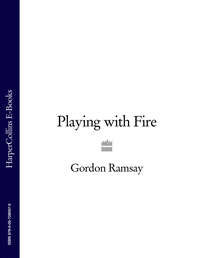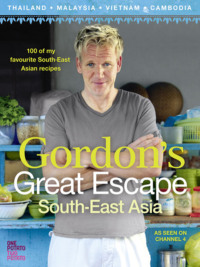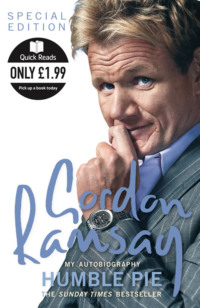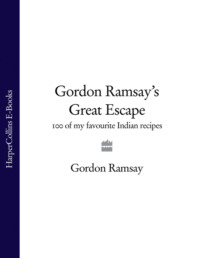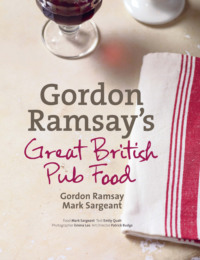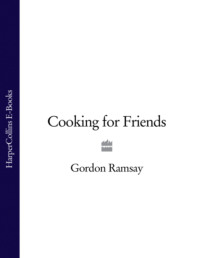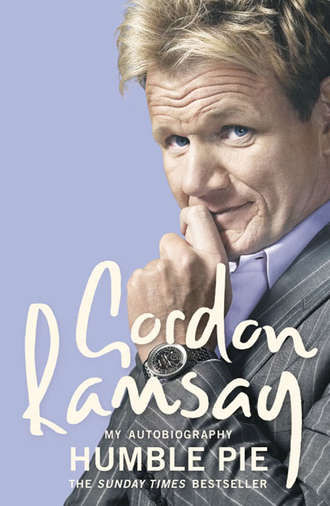
Полная версия
Humble Pie
‘That’s bloody terrible,’ he’d say. ‘You should hit him back.’
Fat lot of good that advice was. Things got so bad that Mum finally worked up the courage to leave him, and the council gave her, Ronnie and Yvonne a flat. But Dad was soon back, pleading forgiveness, promising that everything would be different. And so it would be, for a few weeks. Then he’d start sliding again, back to his old ways, all this anger always pouring out of him. Oh, he was good at crying crocodile tears, but his heart was an empty space where all the normal feelings a man has for his family should have been.
Next, they embarked on some kind of house swap, and the four of them ended up in Bridgwater in Somerset. Same old story…No sooner had they settled in than Dad was off again – this time on a cruise ship. He took Diane with him, to sing, which put Mum’s mind at rest a little because even after everything he’d done to her, she was still worrying that he would run off with someone else, and she had this idea that a cruise would be full of beautiful women. Diane was engaged by this time, and her fiance and Mum saved up to go out and meet the ship in Venice. Mum worked so hard – she had three part-time jobs on the go all at the same time. But when they got there, no sooner had they boarded the ship than Dad had some big, drunken argument with the man who was in charge of the entertainment. This ended with Dad, in a fit of pique, sabotaging all the ship’s musical equipment, at which the captain told him he had to leave. They all came back to London by bus – a fine end to Mum’s dream trip. Did he feel bad about this? Did he feel guilty? Not at all. He had got his revenge, and that was all that mattered.
It was in Bridgwater that he committed the final transgression, and departed our lives – almost for good, if not quite. It’s a time I cannot think about without feeling the blood pulsing in my temples, though I was not even there when it happened. I’m not sure what I’d have done if I had been.
Dad had had a couple of drinks, but he certainly knew what he was doing; this attack was calculated, clever even, not some dumb, drunken rage. He came home from work one night, and he just started. There was no ‘trigger’. Mum was in bed, with a mug of hot milk. He poured it all over her, even as she lay there, leaving bad scalding to her chest. Then he dragged her downstairs, and the beating started. By the time the ambulance arrived, she looked like she’d done five rounds with a heavyweight boxer. Her eyes were completely closed, her face swollen and pulped. First, she was taken to a hospital, then to a refuge. Dad, of course, didn’t stay to face the music. He disappeared at the first sound of a police siren.
A few days later, I finally tracked him down. He was with a woman called Anne, whom he would later marry.
‘Mum’s been in hospital for three days,’ I said. ‘And she’s still wearing sunglasses.’
‘Well, she asked for it,’ he said.
That was when the social services and all the other authorities got fully involved, and a restraining order was taken out on him. He wasn’t allowed anywhere near the house.
But when Mum went home, she found everything that she had built up and saved for smashed to smithereens. He hadn’t left as much as a light bulb intact.
Worst of all, Dad had left a note on the mantelpiece. It said: ‘One night, when you are least expecting it, I’ll come back and finish you off’. Even after the restraining order came into effect, there were some evenings when Mum would be sitting in alone and the phone would ring and she’d hear his voice telling her that he was on his way. Many nights, you would have seen a patrol car parked outside the house, just in case. How she slept, I’ll never know.
Journalists have often asked me whether I loved Dad, whether I had any love at all in my heart for him. The truth is that any time I tried to get close, I’d just come up against this competitive streak in him. Later, my feelings for him hardened into hatred. Everything he did, I was determined to do the opposite. I never wanted to follow in his footsteps, and that’s why I never picked up a fucking guitar, and that’s why I never sat at the fucking piano. Were there any good times? Not really. I suppose the only thing that I really admired about him was the fact that he was a fisherman. He was a great fisherman, there’s no two ways about it. But even that got tainted by all the other stuff.
Ronnie was good at keeping Dad’s secrets, but I made the mistake of telling Mum exactly what he used to get up to. After that, I was never taken fishing again. We used to go to this campsite on the River Tay in Perth – salmon fishing. Ronnie and I would be sitting on the riverbank at nine o’clock at night on our own, fishing, while Dad and his mate Thomas would be out drinking. He’d give us a fiver between us, and tell us to keep ourselves amused. I remember one time when the weather was bad, it was raining heavily, and we’d booked into this little bed-and-breakfast. That night, Ronnie and I ended up sleeping in the bathroom because Dad had brought some woman back. I can’t have been older than twelve at the time.
After a while, Dad went off to Spain, and I didn’t see him for many years. I was too busy trying to make a success of my life, but even if I hadn’t been working every hour God sent, I had no real wish to see him. Dad, though, had a way of turning up when you least expected him, like a bad penny. It was towards the end of 1997. I was busy trying to win my second Michelin star by this point – which should give you some idea of how much time had passed – when I got a call from Ronnie telling me that Dad was in Margate. He’d had an argument with Anne, and Anne’s sons, and he’d upped and left.
I called him on the number Ronnie had given me – I don’t know why. He sounded very low.
‘I’m here to see my doctor,’ he said.
‘Come on,’ I said. ‘Why are you really here?’
‘No, I’m back just to have a check-up.’ There was a pause. Then he said: ‘Can I see you?’
‘Yeah, yeah, I’ll come down.’
It had been a difficult year. My wife, Tana, and I were expecting our first baby. And I was involved in all sorts of legal wrangles over my restaurant, Aubergine. Still, I drove down there. There was something in me that couldn’t refuse his request. We were to meet on the pier where we used to go fishing back when we had lived in the town ourselves, so I knew exactly where he’d be. I got out of my car and I saw this old, frail, white-haired man with bruises on his face, and marks on his knuckles. I felt stunned. This was the man I’d been scared of for so long, brought so low, so pathetic and feeble.
We went and had breakfast in a little cafe. The waiter came over and asked us what we would like and, straight away, Dad started into me, telling me that when I was at home I always used to steal his bread. The words came out of nowhere. Another unwarranted attack.
‘What’s happened to you?’ I said.
‘Oh, Anne and I separated, and I had an argument with one of her sons and he tried to have a go at me.’
‘Look at the state of you. Where are you living?’
He pointed at the car park, and there, as ever, was his Ford Transit van. We went out and I opened it up and inside there were all his possessions: his music equipment, his clothes, and these silly lamps – paraffin lamps – and an inflatable camp bed in the back with these awful net curtains in the windows.
We finished our breakfast, and we went for a walk on the pier, and it was so sad. So I went to the bank, and I got out £1,000 and I gave it to him for the deposit on a flat. I thought that at least I could do the right thing by him. And that’s what he did, he got a little one-bedroomed basement flat. A week later, I went back to see him again. He told me that he was going to be on his own for Christmas. I was in two minds as to what to do. Then I decided: this is not the right time to introduce him to Tana. I felt sorry for him, real pity, but nothing more. And anything I did feel had nothing to do with him being my father; I just felt sorry that a man had to be on his own at that time of year. It seemed so desolate, so bleak.
On Christmas Eve, he telephoned. Anne was coming over to spend the week with him, and they were going to try and resolve their differences. That was the last time I ever spoke to him. Looking back, I wonder if he knew that his time was running out. He’d gone back to Margate because that was where he’d gone on holiday with his parents, as a boy. Perhaps it had happy memories for him. It certainly didn’t for me. Driving back to London after that last visit, I cried my eyes out. What a waste of a life.
After hearing that he and Anne had made up, I booked him a table at Aubergine for the 21st of January, 1998. That was going to be a big, big day for me. First of all, that was Michelin Guide day. The new edition. Second, I was going to introduce this guy, my father, to all my staff. I’d spoken of him so little, most of them didn’t even know I had a father. The truth is that he embarrassed me. When I was eighteen, a girlfriend gave me a gold chain, a massive gold chain – bling before bling was invented – and Dad was envious of it, so incredibly envious. One day he asked me if he could wear it. So I gave it to him. That was the kind of power he had because at the time I loved it half to death. Later, I remember shuddering, seeing him look like some East End spiv, dripping in gold. There was my chain, and sovereign rings, and chunky gold bracelets, all topped off with a white leather jacket. I had never known how to describe this man to anyone, let alone my staff. I’d reinvented myself, I suppose. I’m not ashamed of that. I’ve never tried to pretend anything else. All I knew was that I didn’t want to be like him, and any time I came even close to doing so, I would put the fear of God into myself. My father was in some box that, metaphorically speaking, I’d hidden in a dusty corner of the attic years ago.
And then there was my fear of being used. A while before he came back to England, during a busy service at Aubergine, someone came to me saying I had a phone call from my brother-in-law. At the time, I didn’t have a brother-in-law.
‘Dave, here,’ said the voice.
‘Look, Dave,’ I said. ‘I’m fucking busy right now. I haven’t got time for pranks. You can call me back at fucking midnight.’
But he persisted. He refused to get off the line.
‘Look, Dave,’ I said, again. ‘I don’t know who the fuck you are but this is not the right fucking time. I’m not fucking happy.’
‘Well, I don’t care where you are or what you’re cooking,’ said the voice. ‘My Mum is married to your dad.’
Then it clicked. That, you see, was how little I thought of Dad, and how little I knew about his new life. The voice said: ‘I read that you do consultancy work for Singapore Airlines and my watch is from Singapore, and I can’t get a battery in this country. Is there any chance you could get one for me next time you are out there?’
Perhaps you can imagine how I felt.
‘Are you taking the fucking piss?’ I said.
I put down the phone. Some guy I’d never even met ringing me in the middle of service to ask me to get him a new battery for his watch. I simply could not believe it.
It was New Year’s Eve when we heard that my father died. The family were all in London, staying with me and Tana. It must have been about 3.30 a.m. We’d been in bed for an hour. Then the phone rang. I woke up and answered it and all I could hear was screaming. At first, I thought someone was trying to wish me a Happy New Year, but this person was in hysterics. She kept going on about some drug, how it hadn’t worked. She kept going on about someone called Ricky Scott. I put down the phone. Then, as it began to sink in, I called this person back. It was Anne, and ‘Ricky Scott’ was Dad. Apparently, he’d changed his name. Scott was his mother’s maiden name.
It was his alcoholism that had killed him. Of course, I drove straight down there, to the hospital. I felt fucking robotic. I was just going through the motions. That was the first time I had ever laid eyes on Anne. ‘Oh my God,’ she gasped. ‘You’re so like your father.’ All I remember is lots of people smoking, and drinking tea. I was asked if I wanted to see him – Dad. I said no.
‘I can’t believe you’re not going to see him,’ she said.
‘Well, that’s my choice,’ I said. I knew I wouldn’t be very good at seeing a dead person. It just wasn’t something I could put myself through. Years later, a close friend of mine died. I was asked to go and identify the body. But I couldn’t. I had to send someone else. I wasn’t any stronger then.
For all that I hated him, burying Dad was one of the worst days of my life. The funeral was horrible. She organised it, Anne, in a Margate crematorium so characterless it might as well have been a branch of Tesco. Oh, it was bad, really bad. We walked in, and his songs were playing, him singing. To me, that was the worst thing. And then, all these strangers…We knew no one.
Mum didn’t go, but my sisters did. And Ronnie, though not without a fight. By this time, Ronnie was a desperate heroin addict, and he was refusing to go. I was at my wits’ end. Finally, about an hour before the funeral, I gave him money so that he could buy what he needed to get him through. I thought it was better for him to be there and off his face, than not there at all. How low can you go? Very low indeed, if you’re desperate.
We carried Dad in, in his wooden box, and I could have cried. I started listening to the service, and they were calling him Ricky. That wasn’t even his name. His name’s Gordon, I thought. Why the fuck are they calling him Ricky? Then Anne turned round, and said: ‘I think your father would have wanted you to say a few words.’ So I did.
‘On behalf of the Ramsay family, I just want to say that we don’t know this “Ricky”. Dad’s name is Gordon.’ I got so upset I couldn’t even finish my sentence. I burst into tears. It took me several attempts to get the words out. Afterwards, we tried to be polite. We went and spent the requisite fifteen minutes at the knees-up that she’d organised. But I couldn’t have taken any more than that. Ronnie was out of it in any case. We could have been at a family christening for all he knew.
After that, I drove back to London and I went straight back to the kitchen. I was there, on the pass, working as hard as ever, trying not to think – or at least, to think only about the next order. I don’t think I’ve ever needed my kitchen so much in all my life.
What did my father leave me? A watch, actually. Everything else he ‘owned’ was on hire purchase anyway. He never tasted my cooking in the end, though even if he had, I doubt he would have been impressed. ‘Cooking is for poofs,’ he used to say. ‘Only poofs cook.’
But there is something else, too. Someone, I should say. Dad had another child, a girl, before he met Mum. Her parents adopted the baby. Apparently, Dad had planned on marrying her, but her parents had other ideas. One night, they went to see him sing, and then they followed him home and told him to stay away from their daughter. They threatened to beat him up. Perhaps his performance that evening had been even worse than usual. So that was that. He walked away, and went after Mum instead. My father’s parents knew all about this child, but they kept it from Mum, though she found out, of course – and several times, when she was expecting Diane, she even saw his child.
CHAPTER TWO FOOTBALL
I MUST HAVE been about eight when I realised I was good at football. It was football, not cooking, that was my first real passion. I was a left-footed player – still am – and I was always in the back garden, or out in the close, kicking a ball against the wall. I used to long for Saturday mornings. The night before, I’d polish my boots until I got the most amazing shine on them. I remember my first pair of football boots. They were second-hand, bought from the Barras by Mum, and they didn’t fit properly; I had to wear two or three pairs of socks with them at first. But that didn’t matter to me, because owning them was more exciting than anything.
Football was one way I thought I could impress Dad. Nothing else worked. He never came into school, to see how we were doing, and he never thought our swimming was as good as his. But he and my Uncle Ronald were huge Rangers fans, and I could see that this might be a way to reach him. Uncle Ronald had a season ticket, and any time we went up to Glasgow, we would go off to Ibrox to see a game. I must have been about seven when I went to my first match. I remember being up on Ronald’s shoulders, and the incredible roar of the crowd. It was quite frightening. They still had the terraces in those days, and when the crowd celebrated, everyone surged forward: this great, heaving mass. I was always worried things might kick off, especially during derby matches. There was so much aggression between Rangers and Celtic and I could never understand why they had to be that nasty. My uncle told me that the men all worked together in the shipyard Monday to Friday but when it came to the weekend, they hated one another’s guts. I was very struck by that as a boy.
Back in Stratford, I was chosen to play under-14 football when I was just eleven, and, later, I used to be excused from rugby and athletics because I was representing the county at football; at twelve years old, I played for Warwickshire. So I had a fair idea that other people thought I was good, too. Did I enjoy it? Well, it was certainly better than rugby, which I hated. I was skinny, really skinny, and whenever we played rugby I just used to get mullered. And yes, of course I enjoyed it. I loved it. But if I am honest, it was also a good way of getting out of the house, especially at weekends. If Dad came to watch it was a special relief because at least that meant he wasn’t at home playing country and western, deafening all the neighbours, and giving Mum a hard time. He didn’t always come to watch, though. On those days, you’d come home and Dickie Davies would be on the telly, and while you desperately tried to watch the results, Dad would be busy trying to prove to you that he was a better guitarist than Hank Marvin. Sometimes, he didn’t even ask you the score, or whether or not you’d made any goals. I got used to it.
I had plenty of setbacks along the way, though, my progress was hardly meteoric. For one thing, we moved so often that I always had to secure a place in a new team. Then, when I was fourteen, I had the most terrible footballing accident. I was playing in a county match, in Leamington Spa. In the first two minutes of the game I went up to head a ball, and the miracle was that the ball went straight into the back of the net. Unfortunately, along the way, the goalkeeper had managed to punch me in the stomach and the combination of my exuberance and his mistaking the height of my jump meant that he somehow perforated my spleen. What a nightmare.
I went down and, at first, I thought I was only winded. The referee came over and sat me up and made me do all these sit-ups. I felt dizzy and weird. So he sent me off to get some water. I went to pee and suddenly I was peeing blood, and two minutes later I collapsed. An ambulance was called.
In the hospital, they didn’t know it was my spleen. First, they thought it was my appendix; then they thought it was a collapsed lung. That night, I was doubled over in pain. I was crippled with it and was crying my eyes out. The immense fucking agony, you would not have believed it. The doctors didn’t know what to do. Dad was away for some reason, in Texas, I think, and no one could get hold of Mum, so there was no one to sign the consent forms. In the end, they took me down to surgery anyway and somehow managed to repair the damage, though they took my appendix out as well, in the end. I was scared. I wanted Mum.
The operation really knocked me back. But there was worse to come. Two weeks later, an abscess developed internally. So it was back into hospital. This time, I had blood poisoning. All told, my recovery took three months from start to finish. I couldn’t do anything physical. I couldn’t run, I couldn’t jump and I couldn’t train. That was a terrible blow for a fourteen-year-old boy. And then when I started kicking the ball again, I was nervous about going into a tackle. I had lost my confidence.
If Dad had been there, at the hospital, if he’d understood how serious the situation had been, he might have been a bit more sympathetic. But he wasn’t. When he eventually came back, he announced that he’d managed to get some construction work in Amsterdam, and that he was going to take me with him while I convalesced. I was really excited, but only for one reason. I wanted to go and look at the Ajax stadium. The trouble was, it was only about ten weeks since the operation, I still wasn’t as well as I should have been, and Dad was hardly the kind of man to take care of me. For days, I was just left to wander round this stadium. We were in bed-and-breakfast accommodation, so he would go off to work (though that, predictably, lasted about three weeks), leaving me behind with four guilders to my name. You don’t realise it till later – that you’ve been abandoned. I think now: fuck, I was on my jack, wandering around, a fourteen-year-old boy who’s just had major surgery. It was fun, going to the Ajax stadium one, two, three times. But then – even the fucking gardeners got to know me. That was a very, very strange trip.
I had pictures of my heroes, Kenny Dalglish and Kevin Keegan, on my bedroom wall, but I never thought I’d be professional. Apart from anything, even after the accident, I still had terrible problems with my feet. I was cramming my feet into boots that were too small – the ethos of the day was to get boots that were a size too small. Even my coach told me to do that. Some Saturday nights, I’d sit on the side of the bath, wearing my boots, with my feet in hot water, trying to literally mould the leather around them. To this day, I’ve got toes that are bent at the end – hammer toes. By the time I’m an old man, they’ll be like claws. I never had the money for decent boots, even if they’d been the right size. I had to make them last and then, when they were finally worn out, when they looked like a few bits of old cardboard tied together with string, Mum had to secretly slip me money to buy a new pair.
When we moved down to Banbury, I began playing for Banbury United. I suppose that’s when I started getting noticed, though I was only paid my expenses because I was still at school. I played left back. Every term, players from our team were invited up to Oxford United, where they trained with the third or fourth team, and then played for the reserve side, which meant that they got to spend the most amazing week up there. I was picked up by coach and taken there – the first time that I’d been made to feel special, or any good at all, really. And then the travelling became more of a regular event – though I was crap at that. The coach used to make me feel so ill. A small bowl of porridge for breakfast and then, an hour later, I’d be sick as a dog. Hardly the hard man.
I remember my first serious game like it was yesterday. Dad was away and I couldn’t take Mum because, well, you don’t take your mum to football, do you? It was an English Schools competition, Oxfordshire County vs Inner London, and it was to be held at Loftus Road, the ground of Queens Park Rangers, in London. Amazing. A big, fucking stadium instead of the cow patch we had to play on in Banbury, and all the London players were from the youth teams of Chelsea, Tottenham and Arsenal. I thought we were going to get absolutely hammered – that the score would be 8-0 or something. These guys were bigger and stronger than us. But the funny thing was that we beat them 2-1. But it was a dirty game. I was taken off, fifteen minutes before the end of the second half, after a bad tackle to my knee. Another injury from which it took me ages to recover. Perhaps I was doomed when it came to football.
After I’d recovered, I played in an FA Cup youth game and it was there that a Rangers scout spotted me. They asked if I’d like to spend a week of my next summer holiday with the club. Fucking hell. I couldn’t believe it. It wasn’t just the fact that it was a professional club; it was RANGERS, the one that would really have an impact on the way Dad felt about me – or so I thought. The trouble was, Mum and Dad were going through a really shitty time then, and in a way, it put me under even more pressure. A part of me didn’t want anyone to know, just in case I couldn’t pull it off. I didn’t want to let anyone down and, in doing so, unwittingly make things even worse between them. By this point, I was sixteen and was pushing the upper age limit as far as breaking into professional football went. It was make-or-break time.


